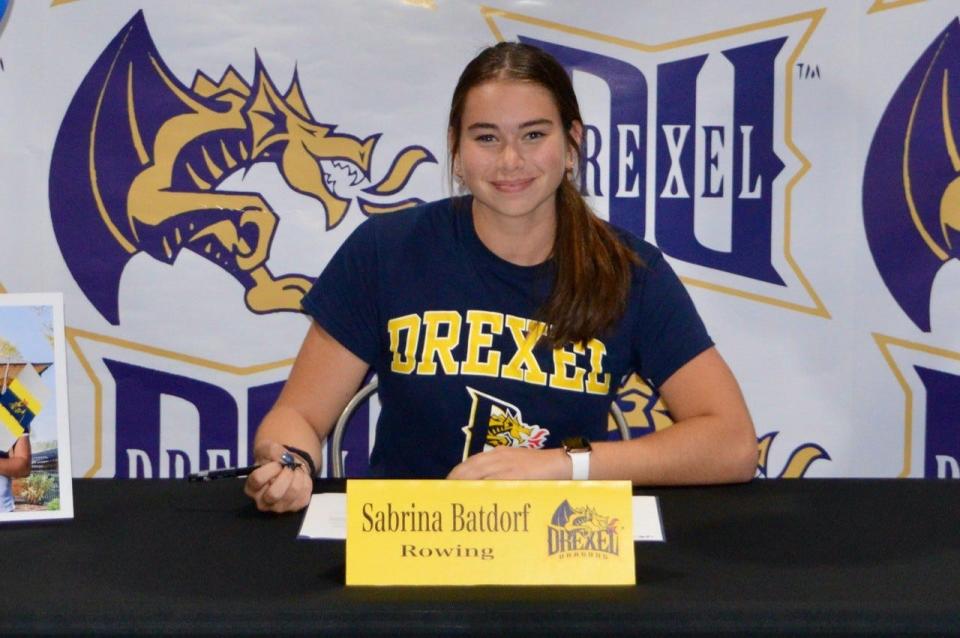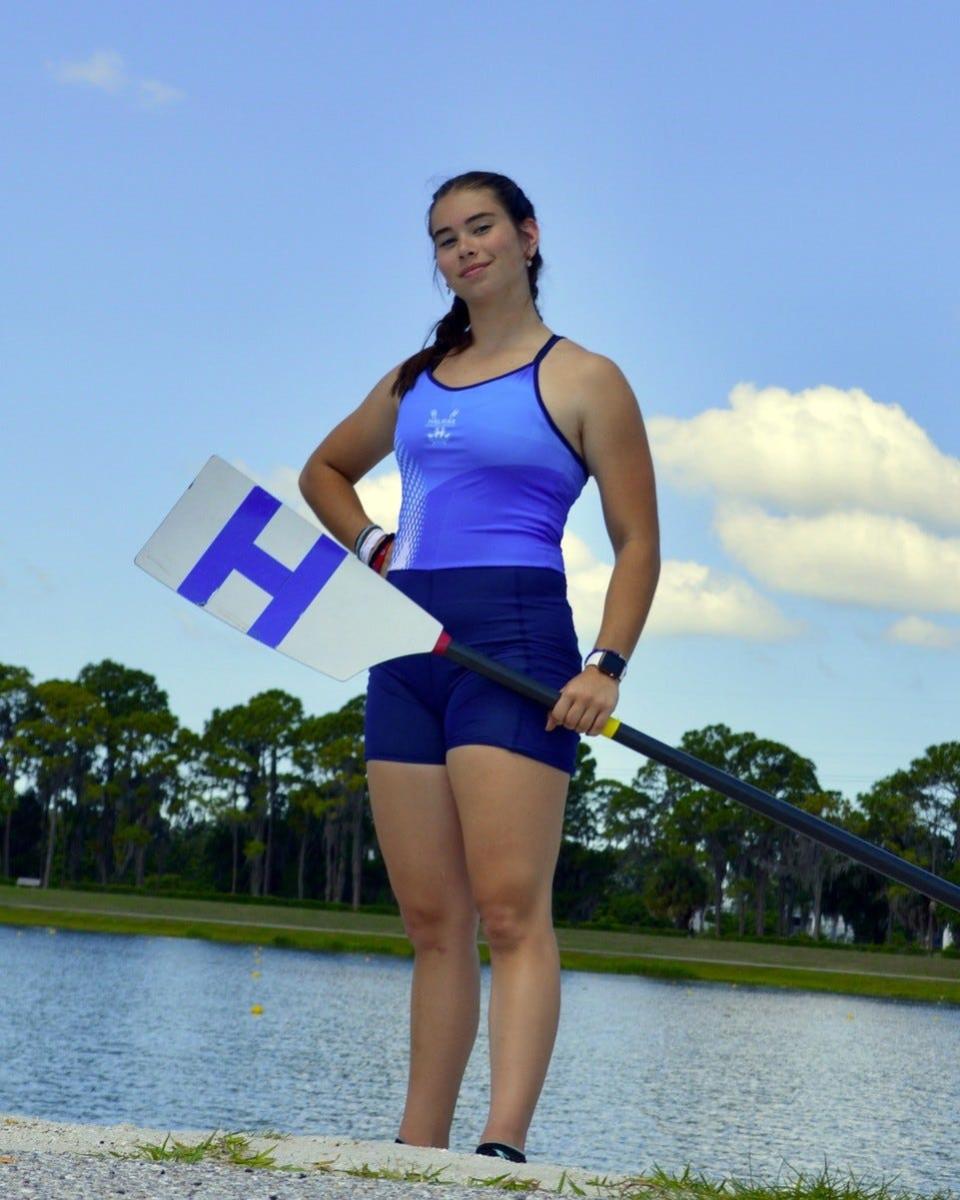After COVID-19 halted her skating career, Drexel commit Sabrina Batdorf ran to rowing
When Sabrina Batdorf was a child, she trained with a legendary figure skating coach named Ron Ludington.
Ludington won a bronze medal at the 1960 Olympics and coached many high-profile skaters and champions. By the time Batdorf started working with him, Ludington was about 80 years old and could tell decades of stories. He had this saying: “When the door opens, be ready to run through.”
And yeah, you could say Batdorf has done just that.
COVID-19 closed the door on her competitive figure skating career, but it opened one for CrossFit, then another for rowing. Batdorf sprinted through both.
Last spring, she committed to Drexel University, in Philadelphia, on a rowing scholarship less than four months after first trying the sport.
“I’m always excited to see someone who is so new to the sport pick it up so quickly,” Drexel associate head coach of rowing Asiya Mahmud said. “Seeing where she currently is to where she can be is really cool. Just figuring out where she could go over the next four years is really exciting.”
FISHING REPORT: A bridge too far? If fishing for reds, it just might be
'Thank you, Deion!': Reggie Theus defends moving Jackson State game after Deion Sanders criticizes the decision

Batdorf’s background
Now 18, Batdorf was born and raised in Newark, Delaware. She began figure skating when she was 8 at the suggestion of her father, Ron. She hated it for the first few weeks.
“Eight years old is very late,” Batdorf said. “Most people start when they’re 3 years old. So everyone around me was like 3 years old and at the same talent level as me. I already kind of felt defeated early on.”
She originally was signed up for eight weeks, and Ron told her to stick it out. As she spent more time at the rink, she liked it more and more — and got better and better. She decided to fully commit.
“I was lucky to be in a place where there was so much skating and history as it was,” Batdorf said. “It wasn’t difficult to find a good coach, good ice and there were a lot of opportunities just because of where I was.”
In 2016, Batdorf’s parents bought a house in Daytona Beach and enrolled her in Florida Virtual School. They kept their home in Delaware so Batdorf could bounce back and forth and continue to train at the High Performance Figure Skating Center at the University of Delaware.
At her peak, she practiced there from 7 a.m. to 4 p.m. — with two one-hour breaks — five days a week. Ron estimated, on average, there were four Olympians with her every time she was on the ice.
Her last United States Figure Skating Association competition came in September 2019, when she placed sixth at the National Solo Dance Final.
COVID-19
Then, COVID-19 shut down her usual Delaware rinks in March of 2020. She came back to Daytona Beach, thinking the shutdown would last only two weeks.
The rinks didn’t open until the summer.
“It felt like a true vacation for a solid week, and then I got so bored,” Batdorf said.
She took up golf. When that didn’t completely satisfy her, she began running three miles a day.
“And I hate running,” she said with a laugh. “So when I started running, everyone was like, ‘Something must definitely be wrong.’ ”
In July, Batdorf eased back into skating at the Daytona Ice Arena.
She returned to Delaware intermittently — she still gets her skates sharpened by a guy there — but it wasn’t the same due to the COVID-forced regulations. The facilities required masks, limited interactions with coaches and other competitors and didn’t allow her to hang around the rink when she wasn’t training. It was walk in, skate, leave.
“It was not that experience of watching your friends and making it a whole experience,” Batdorf said.
She briefly tried to mimic her Delaware training at a place in Fort Myers, but that didn’t last, either.
In the meantime, she skated in Daytona Beach when she could and stayed in shape at the gym. She used to attend a CrossFit gym in Delaware, but she never did CrossFit-style workouts. She had a personal trainer and focused on lifting.
In November of 2020, her mom, Samantha, who is a CrossFit devotee, convinced Batdorf to join her at a CrossFit class. It took a lot of persuading.
“She is very, very competitive every day,” Batdorf said of her mom. “Even this morning, I was working out with her and she got so mad because I beat her by like a round or something. We’re both very competitive, and I didn’t want to open that door up.”
Batdorf soon got hooked, too. She needed an outlet. Both she and her mother now go seven days a week.
“CrossFit is very competitive, and I’m a very competitive person,” Batdorf said. “It was definitely what I needed at the time.”
Rowing
At the gym last December, she met Becca McBride, a former rower at Embry-Riddle.
“As a complete stranger, she walked up to me and said, ‘Are you a rower? You’d be a fantastic rower,’ ” Batdorf said of McBride.
Rowing, along with being a water sport, is a popular CrossFit machine workout. Batdorf had done the workout only a couple times.
McBride hounded her about it, even attempting to convince Batdorf’s parents of her rowing potential, and called a coach at Embry-Riddle to tell him about Batdorf.
Batdorf wasn’t interested in rowing at first. Then, she found out there was college money in the sport. The Embry-Riddle coach gave her a college tour and pointed her toward the Halifax Rowing Association. She joined the club in January.
At her first practice, the team did a 2K test, which judges how quickly someone can row 2,000 meters on a rowing machine. As a beginner, Batdorf was placed with the slower group. She finished in seven minutes and 54 seconds.
“I had someone ask me why I stopped,” Batdorf said. “I told them I finished it. They were like, ‘You finished it? Sub-eight minutes, you finished it?’ Everyone was shocked. I guess sub-eight was really good for a first try.”

She made a profile on a website called BeRecruited and posted her 2K time. Within a month or two, colleges were contacting her and expressing their interest.
Batdorf practiced five days a week with the club and utilized the gym’s rowing machine on her two off days. She competed in a couple regattas in the water, too, but she didn’t do as well as she would’ve liked because she was so new.
“I was so nervous they were going to look at me rowing in the water and be like, ‘You are awful,’ ” Batdorf said. “They didn’t care.”
Mahmud added: “There are plenty of colleges that look for people that have no experience whatsoever. But Sabrina, having competed in skating for so long, developed an understanding of sports and how to be an athlete. That carries over with you.”
She fielded offers from schools like La Salle, St. Joseph’s and Stetson and had it narrowed down to six universities — three in Florida and three up north. By far, her favorite was Drexel, but it also touted the lowest offer.
A couple days before the May 1 commitment deadline, Ron and Samantha told Batdorf Drexel was too expensive. It wasn’t feasible without a bigger scholarship, so she’d have to choose another school.
“I was very upset,” Batdorf said.
The next day, she decided to take her anger out at CrossFit.
“I went so hard in the gym,” Batdorf said. “Harder than I normally do.”
Then, she had a skating lesson and did run-through after run-through.
And then, she had rowing practice. She planned to sit out. She hadn’t eaten all day and didn’t feel good.
Her coach had other ideas.
“The coach was like, ‘2K test! Last one of the season! Make it really good!’ ” Batdorf said.
And she did.
She recorded a time of seven minutes and 38 seconds, besting her previous high mark by 10 seconds and beating the club record.
Immediately, she called her dad. He told her to take a picture of the score and text it to Drexel’s coaches, and they responded right away, asking for a phone call at 7 p.m. that same evening.
Batdorf finished practice at 6:30, drove 20 minutes home and hopped on the call. Drexel offered more money, and she committed right at the deadline.
“It’s almost like God came down and said we’re going to have a test today and you’re going to do good,” Ron said.
Batdorf hasn’t rowed with Halifax since the spring season ended, but she has kept up on the rowing machine. Drexel’s coaches told her not to get back in the water because they didn’t want her to develop any bad habits before she arrived on campus. The earliest Drexel is able to organize team workouts is Sept. 9.
She continues to skate every day at Daytona Ice Arena. Depending on her schedule as a biology major and a rowing team member, she may not be able or allowed to do it regularly much longer.
But then again, during the next four years, who knows which doors will close?
Or open?
This article originally appeared on The Daytona Beach News-Journal: Halifax Rowing Association's Sabrina Batdorf commits to Drexel

